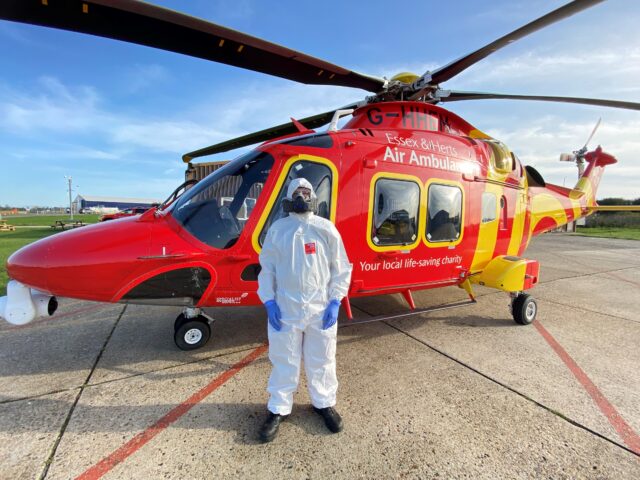Following the busiest year ever for its critical care teams, Essex & Herts Air Ambulance (EHAAT) is now helping with the transfer of some COVID-19 patients between hospitals.
When required, the team based at the charity’s North Weald Airbase travel by helicopter or Rapid Response Vehicle (RRV) to the relevant hospital, and accompany the patient in a designated land ambulance to the receiving hospital. The EHAAT team is able to provide the advanced level of care that allows a safe transfer of this group of patients. At present this is happening once or twice a day. When not engaged with transfers this the team continues providing its normal response to pre-hospital emergencies.
A second team based at EHAAT’s Earls Colne Airbase is continuing to respond to the charity’s normal workload of medical emergencies, cardiac arrests, road traffic collisions, serious injuries etc.
Stuart Elms, Clinical Director at EHAAT said: “As soon as we identified there was a need, we put plans in place in early January to help with these transfers with the same outstanding level of care and clinical governance that we apply to our usual caseload. The first request came in within a few days, and we were happy to help. This is not affecting our ability to respond to emergencies in the normal way, but we will continue to review this.
“The system is currently incredibly busy, and we are helping to move COVID-19 patients from hospitals in our region which are facing challenges due to the unprecedented number of patients they are seeing, to those with capacity. The aim is to help level the load and redistribute this huge demand.
“We are doing everything we can to keep our patients, staff, volunteers and supporters safe at the moment and East of England Ambulance Service NHS Trust (EEAST) are helping us by vaccinating all our frontline patient-facing staff.”
“Please help us and our NHS partners by following the guidelines, staying COVID secure and doing everything you can to ensure friends and family are doing the same.”
Last year was the charity’s busiest ever year, despite a brief fall in the number of incidents its teams were sent to during the first lockdown. Between January and December EHAAT’s crews attended 1,626 patients, up 6% on the 2019 figure of 1,526. One reason for the increase was that 2020 was the first full year of 24/7 operations (see editor’s notes), which began in October 2019. A total of 480 patients were attended at night, who would have previously been in need outside of our operational hours.
2020 was also the first full year in which the charity’s helicopters and RRVs carried blood supplies on board, enabling potentially life-saving blood transfusions to be given on-scene before a patient reaches hospital. A total of 72 patients received blood transfusions at the scene or in the air last year.




